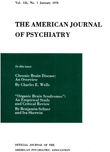THE TREATMENT OF HYSTERICAL DEAFNESS AT HOFF GENERAL HOSPITAL
Abstract
This is a preliminary report of our clinical experiences and treatment of 45 patients afflicted with hysterical deafness.
These patients were given sodium pentothal narcosynthesis. Of this group 16 had been overseas in combat; 14 had been overseas, but not in combat; 15 had no overseas duty. Twenty-two gave a history of deafness prior to induction and one admitted hearing loss for 32 years prior to induction.
In the true hysterical patient the results were spectacular. When there was an element of conscious simulation, an improvement in the hearing loss was observed but normal audiometric readings could not be obtained.
Intensive therapeutic efforts were continued for several days after narcosynthesis, followed by daily consultations with the neuropsychiatrist over a period of 2 to 4 weeks. The condition of these patients having remained stationary, with no evidence of regression during this period of observation, separation from the service was carried out.
The period during which these cases have been observed is insufficient to warrant undue optimism. Failures are anticipated but it is believed that this preliminary study warrants further investigation.
Access content
To read the fulltext, please use one of the options below to sign in or purchase access.- Personal login
- Institutional Login
- Sign in via OpenAthens
- Register for access
-
Please login/register if you wish to pair your device and check access availability.
Not a subscriber?
PsychiatryOnline subscription options offer access to the DSM-5 library, books, journals, CME, and patient resources. This all-in-one virtual library provides psychiatrists and mental health professionals with key resources for diagnosis, treatment, research, and professional development.
Need more help? PsychiatryOnline Customer Service may be reached by emailing [email protected] or by calling 800-368-5777 (in the U.S.) or 703-907-7322 (outside the U.S.).



